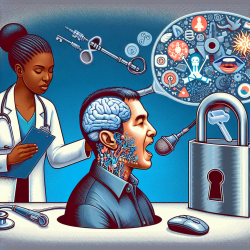As practitioners dedicated to improving communication outcomes for children, it is essential to stay abreast of the latest research and apply data-driven decisions in our therapeutic approaches. A recent study titled Examining Speech Intelligibility and Self-Ratings of Communicative Effectiveness in Speakers With Oromandibular Dystonia Receiving Botulinum Toxin Therapy provides valuable insights that can enhance our understanding and treatment of speech production deficits in patients with oromandibular dystonia (OMD).
OMD is a focal dystonia affecting the mouth and face regions, leading to dysarthria and reduced speech intelligibility. This study investigated the effects of Botulinum toxin type A (BoNT-A) injections on speech intelligibility and self-ratings of communicative effectiveness in individuals with OMD.
Key Findings from the Study
- Significant differences in speech intelligibility and self-ratings of communicative effectiveness were found between control participants and participants with OMD.
- No significant improvements in speech intelligibility or self-ratings of communicative effectiveness were observed post-BoNT-A injections.
- Participants with predominantly lingual dystonia showed a trend toward improved speech intelligibility and communicative effectiveness post-BoNT-A injections.
Implications for Practice
Despite the non-significant overall results, the study highlights several critical areas for practitioners:
- Assessment: Utilize both perceptual and self-rated measures of communicative effectiveness to gain a comprehensive understanding of the impact of speech disorders.
- Individualized Treatment: Recognize that different articulators (e.g., tongue, jaw) may respond differently to BoNT-A, necessitating tailored therapeutic approaches.
- Further Research: Encourage larger scale studies to explore the differential effects of BoNT-A based on the type of dystonia and the affected articulators.
Conclusion
This study underscores the complexity of treating speech production deficits in OMD and the importance of individualized, data-driven therapeutic strategies. By integrating these findings into practice, practitioners can better address the unique needs of their patients and potentially improve communication outcomes.
To read the original research paper, please follow this link: Examining Speech Intelligibility and Self-Ratings of Communicative Effectiveness in Speakers With Oromandibular Dystonia Receiving Botulinum Toxin Therapy.










